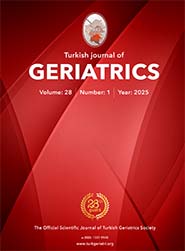2YĂĽksek Ä°htisas University, Neurology, Ankara, Turkey
3Ankara Pursaklar State Hospital, Neurology, Ankara, Turkey DOI : 10.29400/tjgeri.2025.426 Objective: The risk of falling dramatically increases in Alzheimer"s disease. This study utilized static and dynamic balance tests to determine the stage of Alzheimer"s disease at which balance impairment and fall risk become more pronounced.
Materials and Method: A total of 198 patients between 60 and 85 years of age were categorized into normal, mild cognitive impairment, mild dementia, moderate dementia, and advanced dementia based on the standardized Mini- Mental State Examination scores and the Reisberg Global Deterioration Scale. Static tests comprised the Romberg and Single-Leg Stance tests, and the 10- Step Tandem Gait Test was used as the dynamic test.
Results: Patients who failed the single-leg and Romberg tests had significantly lower Mini-Mental State Examination scores (p<0.001) and higher Reisberg Global Deterioration Scale scores (p<0.001). Similarly, failure in the 10- step tandem test correlated with lower Mini-Mental State Examination scores (p<0.001) and higher Reisberg Global Deterioration Scale scores (p<0.001). ROC analysis revealed a significant increase in the single-leg and tandem test failure rates when Mini-Mental State Examination scores dropped below 18.5, while positive Romberg results were significantly below 15.5. For Reisberg Global Deterioration Scale, failure rates rose above scores of 3.5 for the singleleg and tandem tests and above 4.5 for the Romberg test.
Conclusion: In patients with Alzheimer"s disease, balance disorders begin in the early stages and increasing their risk of falls compared to the normal elderly population. Early environmental modifications are critical to prevent falls and injuries.
Keywords : Alzheimer Disease; Neuropsychological Tests; Accidental Falls
